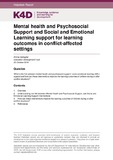| dc.contributor.author | Gallagher, Emma | |
| dc.coverage.spatial | Palestine | en |
| dc.coverage.spatial | Sri Lanka | en |
| dc.coverage.spatial | Uganda | en |
| dc.date.accessioned | 2018-12-21T10:33:18Z | |
| dc.date.available | 2018-12-21T10:33:18Z | |
| dc.date.issued | 2018-10-23 | |
| dc.identifier.citation | Gallagher, E.L., (2018). Mental Health and Psychosocial Support and Socio-economic learning support for Learning Outcomes in Conflict-affected settings. K4D Helpdesk Report. Brighton, UK: Institute of Development Studies. | en |
| dc.identifier.uri | https://opendocs.ids.ac.uk/opendocs/handle/20.500.12413/14209 | |
| dc.description.abstract | This rapid review synthesises findings on the importance of provision of mental health and psychosocial support interventions (MHPSS) and social and emotional learning (SEL) support for protecting or promoting the general psychosocial wellbeing of individuals and the treatment of more serious mental health issues, particularly in conflict or post-conflict situations. In conducting the literature search for this report, several papers which discuss how education can have a positive impact on psychosocial wellbeing were identified. However, the evidence showing the link in the other direction - on the effect of psychosocial support interventions on education outcomes - is sparse. Of the three studies identified which do attempt to show this link between MHPSS and education, one measured school attendance and classroom behaviour only (not learning), while another included academic performance as one element of a multi-component ‘school wellbeing’ metric. It was therefore impossible to ascertain the extent to which the programme had actually improved learning. The third study identified no effect of the intervention on education outcomes. It is therefore impossible to draw any conclusions about MHPSS and their effects on learning other than that a research link may have been established, which is based on evidence from a small number of studies, and often using less objectively verifiable research methods such as self-reported feedback or qualitative interviewing. The review finds body of evidence indicating direct links between SEL and learning is more established than MHPSS; however, given the context-specific nature of both MHPSS and SEL it will not be sufficient to rely on this body of evidence alone. Therefore, there is learning to be had from the US-based studies and the small number of LMICs studies which do exist and can draw a clear link between SEL and learning outcomes. However, further empirical research is needed in order to understand if and how such programmes will work in conflict-affected settings. Aber et al. (2016a; 2016b) makes a useful first step with this but more evidence is required in order to ensure the benefits are transferable. | en |
| dc.language.iso | en | en |
| dc.publisher | IDS | en |
| dc.relation.ispartofseries | K4D Helpdesk Report;475 | |
| dc.rights.uri | https://www.nationalarchives.gov.uk/doc/open-government-licence/version/3/ | en |
| dc.subject | Children and Youth | en |
| dc.subject | Education | en |
| dc.subject | Health | en |
| dc.title | Mental health and Psychosocial Support and Social and Emotional Learning support for Learning Outcomes in Conflict-Affected Settings | en |
| dc.type | Other | en |
| dc.rights.holder | © DFID - Crown copyright 2018. | en |
| dcterms.dateAccepted | 2018-10-23 | |
| rioxxterms.funder | Department for International Development, UK Government | en |
| rioxxterms.identifier.project | K4D | en |
| rioxxterms.version | VoR | en |
| rioxxterms.funder.project | 238a9fa4-fe4a-4380-996b-995f33607ba0 | en |

